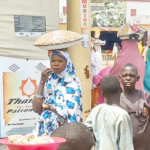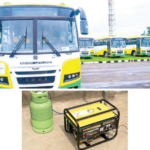The ‘japa’ experience for Dara (not her real name) was in November 2022. However, her destination was not the preferred locations of United Kingdom, the United States or Canada that are the wont of Nigerians.
Her destination was the United Arab Emirates, specifically Dubai. Little did she know that she was about to experience the darkest moments of her life as victim of human trafficking.
Before leaving Nigeria, Dara was made to swear an oath.
Several incisions made on her body as she was made to swear allegiance of absolute obedience to her end-users. This is often the practice of traffickers to ensure that their victims do not escape.
Dara recounted her ordeal of how she was consistently drugged while being raped countless times, leading to several abortions, including an abortion of a set of twins.
She developed psychosis, with several incidences of mental breakdown which eventually led her traffickers to deport her back to Nigeria in February 2023.
The United States Department of State described human trafficking “As both a grave crime and a human rights abuse, it compromises national and economic security, undermines the rule of law, and harms the well-being of individuals and communities everywhere.”
Dara is lucky to be alive to tell her story. According to Migration Data Portal, since 2014, more than 4,000 fatalities have been recorded annually on migratory routes worldwide. The number of deaths recorded, however, represent only a minimum estimate because the majority of migrant deaths around the world go unrecorded. Since 1996, more than 75,000 migrant deaths have been recorded globally. Dara was discovered by volunteers in Oyo State working for the Justice, Development and Peace Commission (JDPC). JDPC is a faith-based organisation of the Catholic church.
A surreptitious phenomenon
Human trafficking is an activity that goes on undetected in society. To unveil the reality of this social evil, JDPC Ibadan conducted a research on Human Trafficking in Oyo State between 2021 and 2022.
The research revealed that “there is high prevalence of human trafficking in Oyo state, the hub area being Ibadan and Oke Ogun areas. The cases of human trafficking are poorly or under reported.
“Also, there is lack of good reporting system, communication gap.
“Majority of those trafficked are women and children. Sadly, majority of the traffickers are also women.
“The general feelings among the populace towards human trafficking victims are that of indifference, nonchalance, blaming. Many people are aware of the consequences of Human Trafficking on the victim, but cannot easily relate it to how it affects other individuals and the people collectively in the society.”
The research also stated that “There is an urgent need to tackle the causes of poverty, economic hardship and unemployment, which has left the people of Oyo State vulnerable to human trafficking. There are limited intervention plans for victims especially from government agencies, and even from the community, traditional and religious groups.
“Many people are ignorant of the existing laws on human trafficking and there is also poor implementation of the laws. 81 percent of the respondents were of the opinion that ignorance of the issues of human trafficking was a major challenge in the fight against human trafficking.”
Need for awareness
On Monday, JDPC Ibadan, in collaboration with Religious Sisters of Charity and with funding from Misean Cara, organised a one-day stakeholders conference on human trafficking.
The meeting involved stakeholders including traditional leaders, local and state government representatives and relevant government agencies including the Nigeria Immigrations Service, National Agency for the Prohibition of Trafficking in Persons (NAPTIP), and Nigeria Security and Civil Defence Corps.
Archbishop of Catholic Archdiocese of Ibadan and Legal Holder, JDPC Ibadan, Most Reverend Gabriel Abegunrin, at the event said: “Human trafficking is so vast that it has become a business. When events like this happen, I expect our government to be involved. Not to give money but to set up forums like this to create awareness. The government should support things of this nature. With government support, this can go a long way.”
The Director of JDPC Ibadan, Very Reverend Father Jerome Ajakaiye noted that although there was an increased awareness about human trafficking, there were difficulties in getting perpetrators prosecuted.
He said, “We have continued to raise awareness about human trafficking. More Nigerians are now aware, particularly in Oyo State.
“But we limit human trafficking to taking people abroad for all kinds of dehumanising activities such as sex slavery or hard labour. But human trafficking is happening within. It is so common that it is even difficult to begin to prosecute all who are involved! For instance, we have house helps who have been brought from all kinds of places – children acting as house help, not going to school, and looking after the babies of their ‘madam’ and oga’. Such cases are so common that you can’t prosecute everyone involved in them.
“There’s the need for people to be prosecuted where there are severe cases of human trafficking, and this can only happen when the relevant agencies collaborate with each other to make sure that such acts are brought to justice.”
Programme Officer Caritas at JDPC Ibadan, Reverend Sister Augustina Offor, referred to the research on Human Trafficking in Oyo State between 2021 and 2022. She said, “From the research, it is obvious that this isn’t a fairy tale. It is happening big time. It is here with us and we need to do everything we can to save humanity. Part of what we discovered in that research is that there is this nonchalant attitude that you find among people. You’ll hear things like: ‘it is not my child,’ ‘I don’t know the person,’ ‘it’s not my concern.’
“But if it is happening to anyone around us, it is happening to us. It comes back to us in different ways. So, there is a need to do whatever we can and desist from that attitude of blaming the victim and saying they got what they deserved, they were greedy and so on.
“We should empathise. The economy is hard. People are looking for ways to survive, so they are easily deceived.”
She added that there are three Ps in the fight against human trafficking. These are prevention, protection and prosecution.
“Prevention is what we are doing now. We are creating awareness as massively as we can so that people can know what is happening. Then protect yourself and people around you. For those who have become victims, we need to report so that perpetrators can be prosecuted.”
WATCH TOP VIDEOS FROM NIGERIAN TRIBUNE TV
- Let’s Talk About SELF-AWARENESS
- Is Your Confidence Mistaken for Pride? Let’s talk about it
- Is Etiquette About Perfection…Or Just Not Being Rude?
- Top Psychologist Reveal 3 Signs You’re Struggling With Imposter Syndrome
- Do You Pick Up Work-Related Calls at Midnight or Never? Let’s Talk About Boundaries







